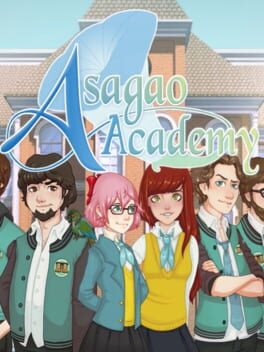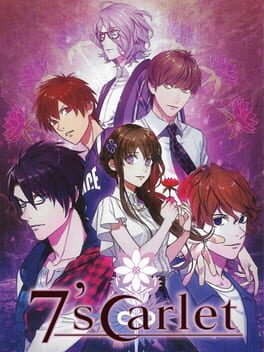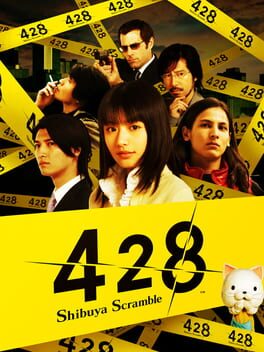ChikageUtsuki
14 reviews liked by ChikageUtsuki
This game is so wholly unique and bizarre, so clearly a time capsule of an internet era, so niche in it's appeal, so insane of a concept, that I can't help but appreciate it. There is no other game like Asagao and I doubt there ever will be anything like it ever again. For that alone, I think it's something to admire. Or at the very least. something to be fascinated by.
That's not to forget the well written, detailed and engaging script, the really pretty artwork and the killer soundtrack. It's clear from the effort the devs put in and the themes the game explores that there's a lot of heart here. It all collides together to make what would be a very well assembled but straight forward shojo visual novel, if it wasn't for the inclusion and branding of Normal Boots in the game.
It's something that's pretty much inseparable from Asagao. Which makes for a confusing emotional experience, for when I played this back in 2016 but even more so now. I don't know if I would ever go back and play this for that reason. But that all the more, just makes it stick out in my mind as the weird oddity of a game it is.
That's not to forget the well written, detailed and engaging script, the really pretty artwork and the killer soundtrack. It's clear from the effort the devs put in and the themes the game explores that there's a lot of heart here. It all collides together to make what would be a very well assembled but straight forward shojo visual novel, if it wasn't for the inclusion and branding of Normal Boots in the game.
It's something that's pretty much inseparable from Asagao. Which makes for a confusing emotional experience, for when I played this back in 2016 but even more so now. I don't know if I would ever go back and play this for that reason. But that all the more, just makes it stick out in my mind as the weird oddity of a game it is.
Neurocracy
2021
The power of a wiki as a storytelling device should not be underestimated. It's almost like a cheat code, allowing endless worldbuilding without the need for a driving plot or much motivation, and allowing articles to both interweave together and for the writer to leave the right gaps. You can tell amazing sounding events with a few mere words, you can get all the information you could ever want across, and a lot of hard work and bad writing can be bypassed by just being blunt and consice. Its very easy to lose hours to something like the SCP wiki, or some anime you'd previously never heard of, or pokemon, or star wars. It's also fun and easy to write, frankly. A common vice of the budding fantasy/sci fi writer is to be way too into the worldbuilding side of things rather than the core conflict, yet the model on display in neurocracy is rewarding to those tendencies - which sounds like it has some great potential.
So when CHUU "Joey" Detchibe put this up on the games club list, I gladly picked it. Cyberpunk future wiki with unpicking murder mystery, yes please, that sounds a dead cert.
But Neurocracy, beyond it's central idea feels like it manages to flub nearly everything to the point where I question why the story was told in this manner at all.
First thing, the worldbuilding - basically the thing this style excels at, is a remarkable combination of being such a tepid cyberpunk world I hesitate to even call it that - and a bunch of elements that are so wild that they completely rip you out of any sense of immersion you might have. You can get away with a lot of handwaving in this style, but Texas being overthrown by a doomsday cult and seceding from the union in 2036, especially when it actually factors into the key murder plot stuff - kinda needs a bit more than that.
It really is not helped by the lack of content. Whilst an element of suspension of disbelief comes with the territory here - these guys cant exactly build a whole wikipedia - the sheer derth of articles and things to read is a big issue that arguably makes the whole project feel moot in the first place. Seriously important elements of the world don't get full pages at all, and literally every single page you can find ties back into the core conspiracies of the narrative without exception. The game compares itself to going down a wikipedia rabbit hole, but its not, because there is very, very little to actually explore. Rabbit puddle, maybe? Even as the in-game days change you get very few new pages and you mostly return to see the changes in the few that exist. The facade that you're uncovering or finding anything wont last more than two pages.
The writing style is also a bit off. It's in the ballpark, and omnipedia isn't meant to be an exact parallell to wikipedia, but it still too often reads like it's leading you down a story rather than presenting facts. The game also has weird tonal issues where it makes frankly oddball takes at satire like introducing "sorrytube, a youtube only for apology videos" which is both not funny and also very discordant with the rest of the content which is played very straight.
Ok, so how about those murder conspiracies? Well, they're better, but that's damming with faint praise. They would probably be fine if the elements of digging around the wikis was actually engaging, but it's not and they end up feeling kind of lacking. I also just don't think this is a really great way of presenting this sort of deep dive? Yeah there's a bit of stuff on information control int he plot here but wikipedia generally isn't as much of an active place to dive on murders and stuff like this so much as forums and social media, which could be done.
Neurocracy just fails on basically every narrative level. God forgive me for what I'm about to say but it is legitimately a way worse tale about going down a internet rabbit hole about murders and stuff than fucking YIIK has.
Joey, can I change my vote?
So when CHUU "Joey" Detchibe put this up on the games club list, I gladly picked it. Cyberpunk future wiki with unpicking murder mystery, yes please, that sounds a dead cert.
But Neurocracy, beyond it's central idea feels like it manages to flub nearly everything to the point where I question why the story was told in this manner at all.
First thing, the worldbuilding - basically the thing this style excels at, is a remarkable combination of being such a tepid cyberpunk world I hesitate to even call it that - and a bunch of elements that are so wild that they completely rip you out of any sense of immersion you might have. You can get away with a lot of handwaving in this style, but Texas being overthrown by a doomsday cult and seceding from the union in 2036, especially when it actually factors into the key murder plot stuff - kinda needs a bit more than that.
It really is not helped by the lack of content. Whilst an element of suspension of disbelief comes with the territory here - these guys cant exactly build a whole wikipedia - the sheer derth of articles and things to read is a big issue that arguably makes the whole project feel moot in the first place. Seriously important elements of the world don't get full pages at all, and literally every single page you can find ties back into the core conspiracies of the narrative without exception. The game compares itself to going down a wikipedia rabbit hole, but its not, because there is very, very little to actually explore. Rabbit puddle, maybe? Even as the in-game days change you get very few new pages and you mostly return to see the changes in the few that exist. The facade that you're uncovering or finding anything wont last more than two pages.
The writing style is also a bit off. It's in the ballpark, and omnipedia isn't meant to be an exact parallell to wikipedia, but it still too often reads like it's leading you down a story rather than presenting facts. The game also has weird tonal issues where it makes frankly oddball takes at satire like introducing "sorrytube, a youtube only for apology videos" which is both not funny and also very discordant with the rest of the content which is played very straight.
Ok, so how about those murder conspiracies? Well, they're better, but that's damming with faint praise. They would probably be fine if the elements of digging around the wikis was actually engaging, but it's not and they end up feeling kind of lacking. I also just don't think this is a really great way of presenting this sort of deep dive? Yeah there's a bit of stuff on information control int he plot here but wikipedia generally isn't as much of an active place to dive on murders and stuff like this so much as forums and social media, which could be done.
Neurocracy just fails on basically every narrative level. God forgive me for what I'm about to say but it is legitimately a way worse tale about going down a internet rabbit hole about murders and stuff than fucking YIIK has.
Joey, can I change my vote?
Neurocracy
2021
Neurocracy
2021
It's impossible for me not to compare Neurocracy to a game like Hypnospace Outlaw without bias simply due to both games being "website browser simulators" and the latter being one of my favorite gaming experiences I've ever had for a multitude of reasons.
The key difference lies in the surface-level "game" aspect to it though. Hypnospace initially gives you a task of "look for rules being broken online" and then builds its world and narrative from that, alongside a tremendous amount of care in its presentation and aesthetics.
From the perspective of someone who only learned about it just now in the year 2023, Neurocracy effectively throws a website at you and says "read up, kiddo." And then it limits the amount of deep-diving you're actually allowed to do (when you hover over individual names, often it just gives you a short blurb about them without letting you view a detailed wiki-style article). While I feel like that's kind of the point given the context of "AI-written wikipedia articles with publishing approval clutched tightly by a select few elite," it's...not that fun?
To quote Cadensia's review, "the only reward the player will have is within themselves and nowhere else."
I don't love this. I don't think it's bad, but a project like this needs some kind of additional motivator for me to appreciate experiencing the world it tries to build.
I'd honestly rather just take an actual deep-dive into Wikipedia.
The key difference lies in the surface-level "game" aspect to it though. Hypnospace initially gives you a task of "look for rules being broken online" and then builds its world and narrative from that, alongside a tremendous amount of care in its presentation and aesthetics.
From the perspective of someone who only learned about it just now in the year 2023, Neurocracy effectively throws a website at you and says "read up, kiddo." And then it limits the amount of deep-diving you're actually allowed to do (when you hover over individual names, often it just gives you a short blurb about them without letting you view a detailed wiki-style article). While I feel like that's kind of the point given the context of "AI-written wikipedia articles with publishing approval clutched tightly by a select few elite," it's...not that fun?
To quote Cadensia's review, "the only reward the player will have is within themselves and nowhere else."
I don't love this. I don't think it's bad, but a project like this needs some kind of additional motivator for me to appreciate experiencing the world it tries to build.
I'd honestly rather just take an actual deep-dive into Wikipedia.
7'Scarlet
2016
7'Scarlet
2016
7'Scarlet
2016
Pure, unfiltered, unadulterated fun. Full motion video games and Visual Novels have fused together to unleash their full potential. Absolute clusterfuck of a story coupled with unrivaled cheese and unforgettable characters, everyone really looked like they were having the time of their lives behind the scenes.
It loses a few points for how cryptic and tedious it might be to progress the story if you get one of the very funny bad endings and don't know which character caused it and the whole thing about the true ending having you spare a bioterrorist because killing people is wrong somewhat irks me but aside from that, it's a must read for sure.
I wish this was more talked about in the VN circle but VN nerds are too busy praising anime tits mcgee spouting high-school tier philosophy lessons while getting fucked by dogs or something.
Achi Endo is the most based character in all of fiction. Don't forget to recycle.
It loses a few points for how cryptic and tedious it might be to progress the story if you get one of the very funny bad endings and don't know which character caused it and the whole thing about the true ending having you spare a bioterrorist because killing people is wrong somewhat irks me but aside from that, it's a must read for sure.
I wish this was more talked about in the VN circle but VN nerds are too busy praising anime tits mcgee spouting high-school tier philosophy lessons while getting fucked by dogs or something.
Achi Endo is the most based character in all of fiction. Don't forget to recycle.
First things first. Let’s get my bias out of the way. I spent a semester at a university in Tokyo and I adore the Shibuya area. I could spend all day at music stores there. I’ve been to the underground bars and to the 10th floor karaoke rooms, to the Hachiko statue and to the Sega GiGo arcade (RIP).
So when a game opens with a flyover video of Shibuya, it really hits me in the feels.
The opening chapter was a bit tedious as I came to grips with the jump mechanic and frequent dead ends, but in the second hour the game added three more protagonists to the mix and the entire experience came alive. Seemingly inconsequential choices began impacting other characters’ timelines, and the bad endings that seemed like annoying roadblocks in the first chapter became more and more entertaining.
The story and characters mostly follow the old tropes, and towards the end there are plenty of those character-building flashbacks that are all too common in manga and anime. But the characters are fun, the pacing never falters, and there are just enough twists to keep the proceedings engaging. Most of them I saw coming but the biggest one was a total surprise.
What really elevates 428 above similar VNs, though, is the decision to use real actors. It keeps the story grounded and prevents the game from drifting into the metaphysical and fan-servicey holes that occasionally derail other Spike Chunsoft VNs.
Unfortunately, there is still a handful of cringe here. For example, an important aspect of the story focuses on a character’s trip to the “Middle East” (which country?) where he/she meets a girl named Canaan. What a name, eh? (And as I writing this review, I’m realizing that another character is probably named after a Toyota minivan. Wow.) Although I’m kind of inured to the fact that Japanese media usually represents foreign people and countries in oddball, half-baked ways, I still wish they could do better.
But honestly, that’s my only real complaint. Yeah, the interface is dated. There aren’t enough female protagonists. The most interesting main character (Minorikawa!) has the weakest connection to the underlying story. I could go on, I’m sure. But when it comes down to it all the little imperfections are kind of perfect.
All that is to say I agree with Famitsu on this one. 40/40.
So when a game opens with a flyover video of Shibuya, it really hits me in the feels.
The opening chapter was a bit tedious as I came to grips with the jump mechanic and frequent dead ends, but in the second hour the game added three more protagonists to the mix and the entire experience came alive. Seemingly inconsequential choices began impacting other characters’ timelines, and the bad endings that seemed like annoying roadblocks in the first chapter became more and more entertaining.
The story and characters mostly follow the old tropes, and towards the end there are plenty of those character-building flashbacks that are all too common in manga and anime. But the characters are fun, the pacing never falters, and there are just enough twists to keep the proceedings engaging. Most of them I saw coming but the biggest one was a total surprise.
What really elevates 428 above similar VNs, though, is the decision to use real actors. It keeps the story grounded and prevents the game from drifting into the metaphysical and fan-servicey holes that occasionally derail other Spike Chunsoft VNs.
Unfortunately, there is still a handful of cringe here. For example, an important aspect of the story focuses on a character’s trip to the “Middle East” (which country?) where he/she meets a girl named Canaan. What a name, eh? (And as I writing this review, I’m realizing that another character is probably named after a Toyota minivan. Wow.) Although I’m kind of inured to the fact that Japanese media usually represents foreign people and countries in oddball, half-baked ways, I still wish they could do better.
But honestly, that’s my only real complaint. Yeah, the interface is dated. There aren’t enough female protagonists. The most interesting main character (Minorikawa!) has the weakest connection to the underlying story. I could go on, I’m sure. But when it comes down to it all the little imperfections are kind of perfect.
All that is to say I agree with Famitsu on this one. 40/40.



